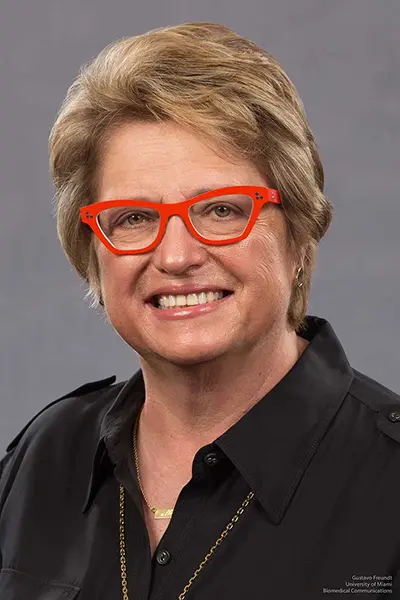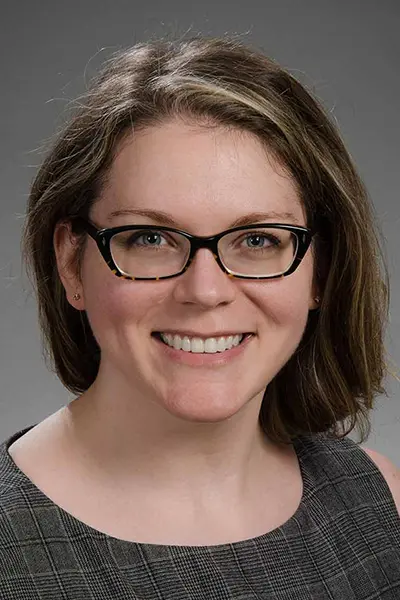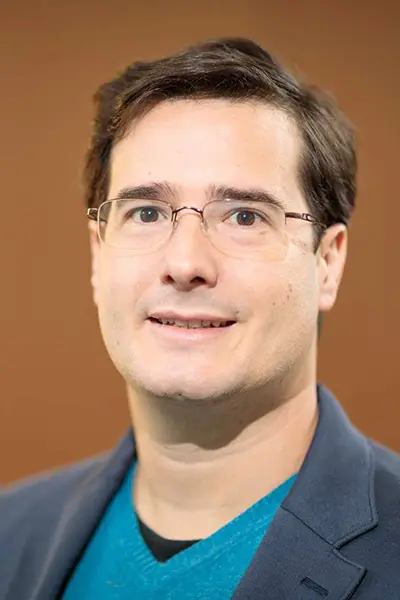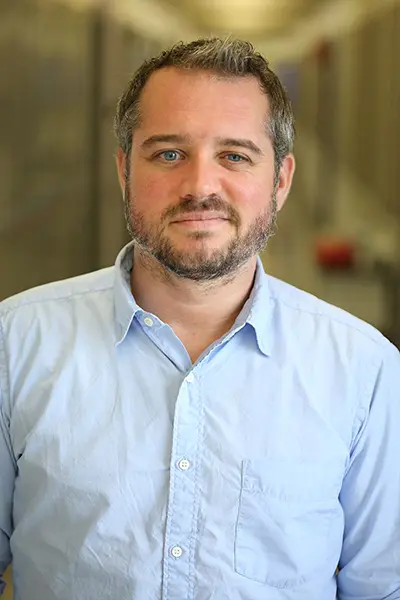Advancing the conversation around Alzheimer’s genetics
The 2021 Alzheimer’s Disease Genetics Global Symposium: Pathway to Translation was supported by the Alzheimer’s Association and the National Institute on Aging. This virtual conference convened the dementia research community to discuss how discoveries in genetics impact biomarker development and target discovery and validation, and how to apply these findings in basic and translational research.
Free On-Demand Webinars
The symposium offered 40+ presentations from global experts in the field of AD genetics.
Recorded Q&A Discussion
Presenters shared their research and responded to attendee questions.
The 2021 virtual symposium has ended. Contact AAICsymposia@alz.org with any questions.
Organizing Committee
Margaret A. Pericak-Vance, Ph.D.

Margaret A. Pericak-Vance, Ph.D., is the director of the John P. Hussman Institute for Human Genomics and the executive vice chair of the Dr. John T. Macdonald Foundation Department of Human Genetics at the University of Miami Miller School of Medicine. Board-certified by the American Board of Medical Specialties in medical genetics, she is a founding fellow of the American College of Medical Genetics and an elected member of the National Academy of Medicine. Her productivity in genetics research has resulted in more than 725 peer-reviewed papers. Dr. Pericak-Vance’s laboratory made the seminal discovery of the first association of a common genetic risk variant, the apolipoprotein ε4 allele (APOE-4) for late-onset Alzheimer disease, followed closely by the identification of the APOE-2 allele as a genetic protective variant for Alzheimer disease. Many of Dr. Pericak-Vanceʹs efforts are directed towards addressing health disparities in genomics research. She directs several related genetic research projects, one on Alzheimer disease in African Americans and a second on admixed Caribbean Hispanic and Amerindian populations. Dr. Pericak-Vance is the recipient of numerous awards, including the international ʺLouis Dʺ Scientific Prize from the Institut de Franceʹs Academie des Sciences for her Alzheimer’s disease research, the Bengt Winblad Lifetime Achievement Award from the Alzheimerʹs Association and the Snow and Ming Tsuang Lifetime Achievement Award from the International Society of Psychiatric Genetics (ISPG) for her lifelong contribution to psychiatric disease research.
Elizabeth Blue, Ph.D.

Elizabeth Blue, Ph.D., is an associate professor in the Division of Medical Genetics within the Department of Medicine at the University of Washington, where she is a member of the Institute for Public Health Genetics faculty and an assistant director of the Washington State Twin Registry. She is also a Fellow Member of the International Genetic Epidemiology Society, currently serving on the communications committee. She received her Ph.D. in anthropology at the University of Utah, with a focus on population genetics, followed by postdoctoral training in statistical genetics at the University of Washington. Dr. Blue’s research incorporates tools from population genetics and genetic epidemiology to detect genetic variants or regions of the genome influencing disease. Her long-term research goals are to identify variants influencing disease within and between human populations, as well as to predict and evaluate their functions. While her lab focuses on genetic modifiers of Alzheimer’s disease, she is highly collaborative with leadership roles in the Alzheimer's Disease Sequencing Project, the Cystic Fibrosis Genome Project, the University of Washington Center for Mendelian Genomics and the Pacific Northwest Undiagnosed Diseases Network.
Carlos Cruchaga, Ph.D.

Carlos Cruchaga, Ph.D., is a human genomicist with expertise in multiomics, informatics and neurodegeneration. He completed his Ph.D. in biochemistry and molecular biology in 2005 at the University of Navarra (Spain). During his first postdoctoral with Dr. Pastor, he conducted statistical human genetics studies focused on Alzheimer’s (AD) and Parkinson disease (PD). He then moved to the Goate Lab to complete his training in quantitative human genomics. Dr. Cruchaga established his laboratory at Washington University in St. Louis in 2011, studying the genetic architecture of neurodegenerative diseases. His interests are focused in using human genomic and multiomic data (epigenomic, transcriptomic, proteomic, metabolomics, lipidomics) to identify and understand the biological process that lead to AD, PD, frontotemporal dementia and other neurodegenerative processes, and to identify novel biomarkers and drug targets. In 2019, he became the scientific director of the McDonnell Genome Institute (MGI) at Washington University and funding director of the NeuroGenomics and Informatics Center.
Richard Mayeux, M.D., M.P.H.

Richard Mayeux, M.D., M.P.H., is the Gertrude H. Sergievsky professor of neurology, psychiatry and epidemiology at Columbia University. He is currently the chairman of neurology and neurologist-in-chief for the New York Presbyterian Hospital, Columbia University Campus; the director of the Gertrude H. Sergievsky Center, a center devoted to the epidemiological investigation of neurological diseases; and the co-director of the Taub Institute for Research on Alzheimer Disease and the Aging Brain at Columbia University Medical Center.
He completed undergraduate work in mammalian physiology at Oklahoma State University and medical school at the University of Oklahoma Health Sciences Center where he was elected to AOA and graduated with honors. He trained in internal medicine at the Boston City Hospital before coming to the Columbia University Neurological Institute for his neurology residency. Following a fellowship in behavioral neurology at the Boston Veterans Administration Hospital, he joined the faculty in the Department of Neurology. He subsequently completed graduate work in epidemiology and was a visiting faculty member at Rockefeller University in the Laboratory of Statistical Genetics.
Dr. Mayeux’s research focuses on Alzheimer’s disease and other degenerative diseases of the aging brain, genetics and epidemiology. He was elected to the Association of American Physicians, the American Epidemiological Society and The National Academy of Medicine. He is an author on over 500 publications. He has received honors including The Leadership and Excellence in Alzheimer Disease Award from the National Institute of Aging, the 2007 Potamkin Prize from the American Academy of Neurology, the 2008 John Stearns Award for Lifetime Achievement in Medicine from the New York Academy of Medicine, the 2009 Henry Wisniewski Lifetime Achievement Award in Alzheimer’s Disease Research from the Alzheimer’s Association, and in 2013 he was elected a Fellow in American Association for the Advancement of Science.
Eric McDade, D.O.

Eric McDade, D.O., is an associate professor of neurology at the Washington University School of Medicine in St. Louis. His research interests include the application of cerebrospinal fluid and neuroimaging measures to identify early pathology of Alzheimer’s disease, the interaction of cerebrovascular function and Alzheimer’s pathology, with the ultimate goal of identifying early markers of Alzheimer’s disease progression that can be used in testing disease modifying therapies.
Dr. McDade serves as the associate director of the Dominantly Inherited Alzheimer’s Disease Trials Unit and the clinical core leader of the Dominantly Inherited Alzheimer Network (DIAN) Observational Study where he and his colleagues are using a global, natural history study to develop prevention trials for dominantly inherited AD. As part of this work he is the principle investigator of the first ever primary prevention trial in familial Alzheimer disease, which will test whether preventing the development of amyloid plaques will prevent the development of dementia in those with a genetic form of the Alzheimer’s disease that leads to young-onset dementia.
Alan Renton, Ph.D.

Alan Renton, Ph.D., is a neurogeneticist and molecular cell biologist whose interests focus on resolving the genetic and functional architecture of neurodegenerative disorders, principally Alzheimer’s disease, amyotrophic lateral sclerosis, frontotemporal dementia, progressive supranuclear palsy and Parkinson’s disease.
He obtained his Ph.D. from the Institute of Neurology, University College London, and undertook postdoctoral training at the National Institute on Aging and the Icahn School of Medicine at Mount Sinai, where he has been an assistant professor since 2019.
Dr. Renton applies primarily computational and collaborative approaches to identify genetic factors driving neurodegeneration and elucidate their pathogenic mechanisms. Examples include association studies to identify novel disease loci and genes, functional mapping of known disease-associated loci to prioritize causal genes and variants, and investigating the role of somatic mosaicism in neurodegenerative pathogenesis and its relationship to phenotypic pleiotropy.
Badri N. Vardarajan, Ph.D.

Badri N. Vardarajan, Ph.D., is a bioinformatics scientist with over ten years of experience in the multi-institutional studies of genetics of Alzheimer’s disease. He obtained his Ph.D. in bioinformatics from Boston University and is currently a faculty member at Columbia University’s Department of Neurology. Dr. Vardarajan has done extensive work in implementing computational approaches to gene discovery in AD. He is one of the principal investigators of the Alzheimer’s Disease Sequencing Project — Follow Up Study (ADSP-FUS), with the goal of whole genome sequencing ~20,000 Alzheimer’s disease patients and matched controls from minority cohorts to understand the genetic architecture of Alzheimer’s disease. He also co-leads an AD multiomics study to integrate genetic, transcriptomic, proteomic and metabolomics data for gene and pathway discovery in Caribbean Hispanic families.
©
Alzheimer's Association®.
All rights reserved. Alzheimer's Association is a not-for-profit 501(c)(3) organization.
Security and Privacy Policy | alz.org
